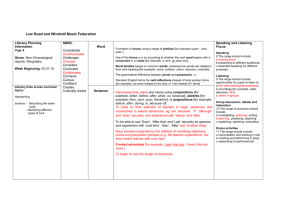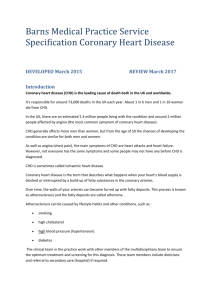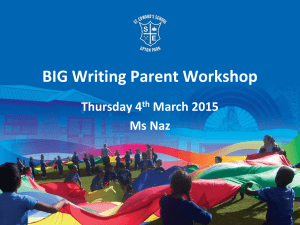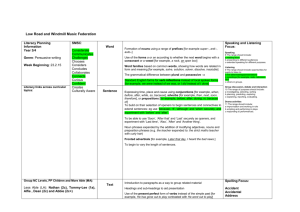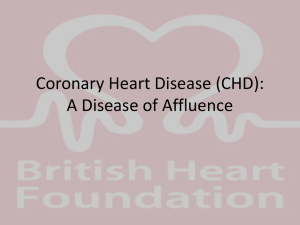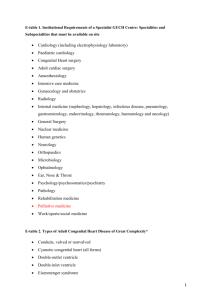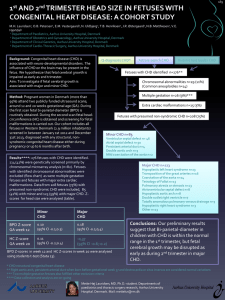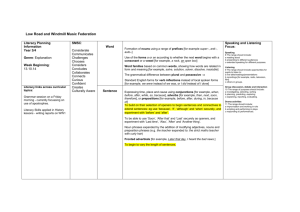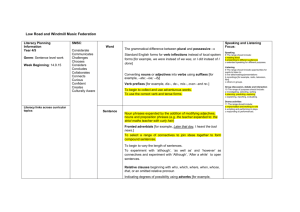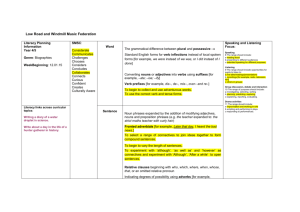Low Road and Windmill Music Federation
advertisement
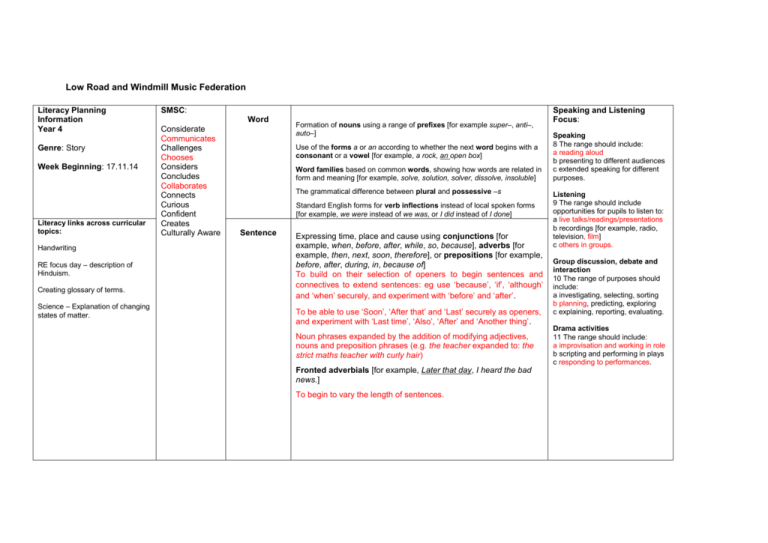
Low Road and Windmill Music Federation Literacy Planning Information Year 4 Genre: Story Week Beginning: 17.11.14 Literacy links across curricular topics: Handwriting RE focus day – description of Hinduism. Creating glossary of terms. Science – Explanation of changing states of matter. SMSC: Word Considerate Communicates Challenges Chooses Considers Concludes Collaborates Connects Curious Confident Creates Culturally Aware Formation of nouns using a range of prefixes [for example super–, anti–, auto–] Use of the forms a or an according to whether the next word begins with a consonant or a vowel [for example, a rock, an open box] Word families based on common words, showing how words are related in form and meaning [for example, solve, solution, solver, dissolve, insoluble] The grammatical difference between plural and possessive –s Standard English forms for verb inflections instead of local spoken forms [for example, we were instead of we was, or I did instead of I done] Sentence Expressing time, place and cause using conjunctions [for example, when, before, after, while, so, because], adverbs [for example, then, next, soon, therefore], or prepositions [for example, before, after, during, in, because of] To build on their selection of openers to begin sentences and connectives to extend sentences: eg use ‘because’, ‘if’, ‘although’ and ‘when’ securely, and experiment with ‘before’ and ‘after’. To be able to use ‘Soon’, ‘After that’ and ‘Last’ securely as openers, and experiment with ‘Last time’, ‘Also’, ‘After’ and ‘Another thing’. Noun phrases expanded by the addition of modifying adjectives, nouns and preposition phrases (e.g. the teacher expanded to: the strict maths teacher with curly hair) Fronted adverbials [for example, Later that day, I heard the bad news.] To begin to vary the length of sentences. Speaking and Listening Focus: Speaking 8 The range should include: a reading aloud b presenting to different audiences c extended speaking for different purposes. Listening 9 The range should include opportunities for pupils to listen to: a live talks/readings/presentations b recordings [for example, radio, television, film] c others in groups. Group discussion, debate and interaction 10 The range of purposes should include: a investigating, selecting, sorting b planning, predicting, exploring c explaining, reporting, evaluating. Drama activities 11 The range should include: a improvisation and working in role b scripting and performing in plays c responding to performances. Group NC Levels, PP Children and More Able (MA): Ironman (HA) – Lily Turner 3B+, Declan Blackley 3B (PP), Macy Torrence 3B (PP), Honey-Lily 3B (PP), Hollie Mills 3B (PP), Matthew Shevill 3B (PP). Text Headings and sub-headings to aid presentation Use of the present perfect form of verbs instead of the simple past [for example, He has gone out to play contrasted with He went out to play] To produce a structured text with a beginning, middle and end. Create settings, characters and plot Captain America (HA) – Ben Dean 3C+, Jason Brook 3C+ (PP), Alfie Corrigan 3C+, Jason Gomes 3C+ (PP), Rahul Kirbakaran 3C+, Maciej Goldyn 3C+ (PP), Spiderman (LA) – Darcy Hughes 2A (PP), Kia Keith 2A (PP), Millie Mae Foster 2A. Erica Hardy 2B (PP) Spelling Focus: With JP away at Lineham all week and EA having other commitments during phonics, the class will focus on learning words from the new NC Year 4 spellings. To structure writing with clear opening and closing statements Appropriate choice of pronoun or noun within and across sentences to aid cohesion and avoid repetition To begin to identify the features associated with different types of writing and include these in their writing. Thor (MA)– Kenzo Tagne 3C (PP), Harry Taylor 3C (P), Terry-James Ward 3C (PP), Leah Squires 3C (P). Incredible Hulk (LA) – Oliver Leadill 2A+ (PP), Jake Stephenson 2A+, Joseph Makintewa 2A (PP), Lewis Gale 2A, Tia-Jade Cowburn 2A (PP) Introduction to paragraphs as a way to group related material Punctuation Construct sentences consistently using capital letters, full stops, commas to separate items in a list, exclamation marks and question marks. Use of inverted commas and other punctuation to indicate direct speech [for example, a comma after the reporting clause; end punctuation within inverted commas: The conductor shouted, “Sit down!”] Apostrophes to mark plural possession [for example, the girl’s name, the girls’ names] Words chosen to help story writing and from marking children’s books: enough caught difficult favourite heard imagine peculiar perhaps probably thought Connection/ Introduction Learning Objective Writing my own short adventure story. Story Beginning Teaching Starter – play adverb charades with class. chd draw out a verb and adverb and act out. Learning Chd continue to write the opening and the opening only. Stress that they must not go past this point. We are aiming to set the scene with descritption and leave the reader wanting more. Re-cap what is needed for a good adventure story. As a group come up with a steps to success. HA – Independent work. Focus on a range of sentence openers. Watch the video. Ask chd to create a timeline of events on whiteboards. LA – Range of sentence openers and a word bank. Reflection Session 1: Activation MA – A range of sentence openers given and a word bank. Watch again and ask pupils to write down as many descriptive words as possible. RE – to support around the room, main focus on Jake Stephenson. Reflection Spiderman – guided group with EA Discuss characters names and create a timeline for the beginning on board. EXTENSION – begin to think of ideas for possible dilemma. Feedback. Discuss what makes a good introduction – hook the reader. How can we do this? Build up. Writing my own short adventure story. Share write the opening sentence. Starter – their or there? Chd to choose the correct form and complete the paragraph. HA – Independent – focus on trying to include speech. Story Ask a chd to read out their opening to jog memories about story. Looking at steps to success (again to ensure pupils are using it) chd to critique the opening. MA – Word bank and sample sentence openers LA – Continued support from EA. Ask chd what has to come next. RE to focus on rest of group. Watch clip of Lucy meeting Mr Tumnus. Extension – begin to think of ideas for possible resolution – how could this happen?? Ask chd in pairs to come up with 3 Reflection Dilemma, problem, middle Chd to continue with their story. Reflection Session 2: possible dilemmas that Lucy could face. Discuss as a group and decide on which one to choose. Shared write the continuation of the story. Reflectio n Session 3: RE focus day - Hinduism Session 4: Story Resolutio n, end Writing my own short adventure story. Starter – Connectives ping pong. Chd to finish their story. Ask chd to tell class where we left the story. Look at steps to success and tick off what has been included. HA – Independent – focus on trying to include speech. Read a possible ending that I have created (as applicable to the dilemma the class agreed on). LA – Continued support from EA. MA – Word bank and sample sentence openers What is good but what could be improved? Together in mixed ability pairs, chd uplevel the possible ending. Shared write the next sentence. Homework: Write own adventure story Reflection RE to focus on rest of group. Session 5: Reflection Homework:
